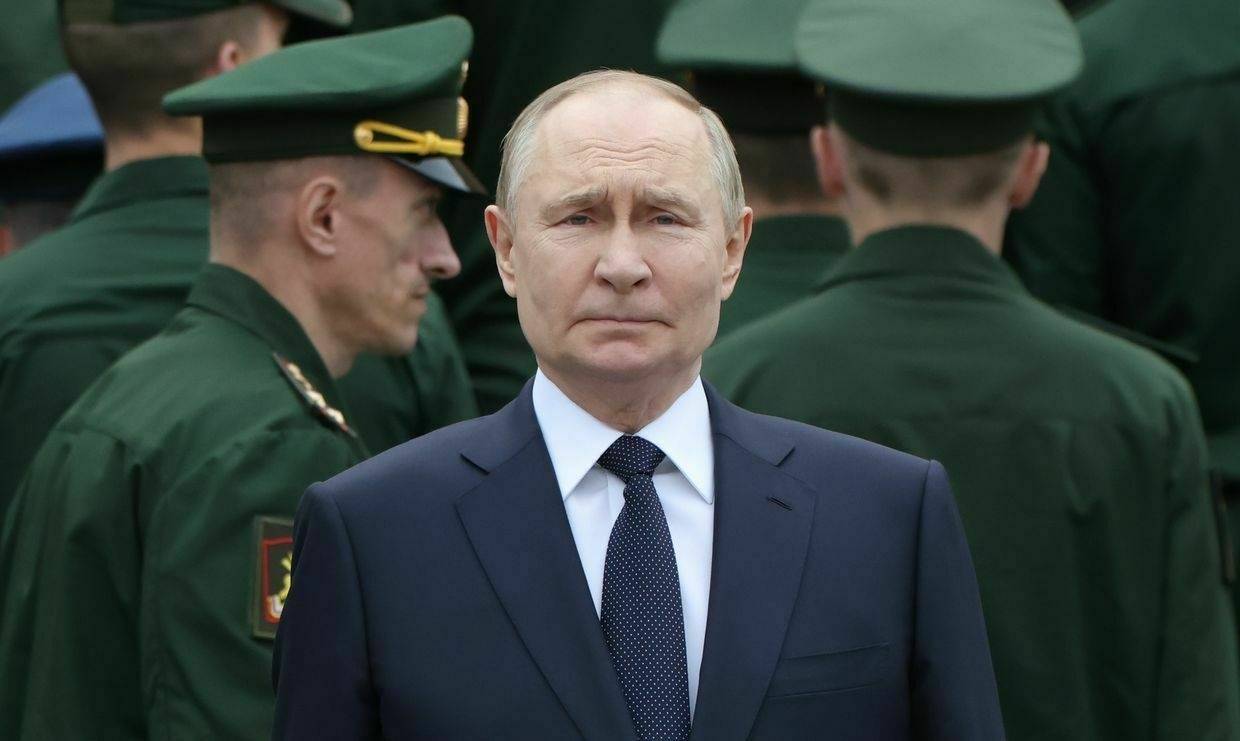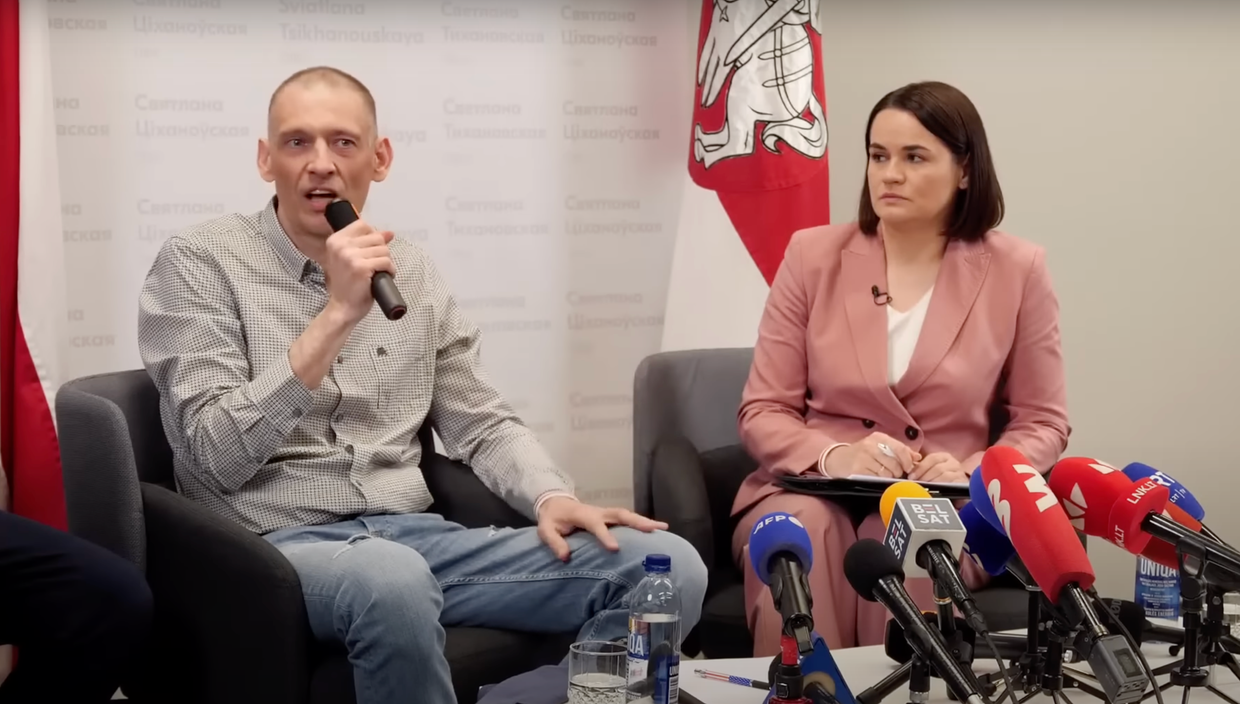
After a high-level U.S. visit to Belarus led to the release of 14 prisoners, observers have been left wondering what autocrat Alexander Lukashenko may have secured in return.
U.S. President Donald Trump’s special envoy to Ukraine and Russia Keith Kellogg’s visit to Minsk on June 21 marked the highest-level diplomatic contact the isolated regime of Alexander Lukashenko had with the U.S. in years.
The trip was also marked by the freeing by the Lukashenko regime of 14 prisoners, including one of the most notable of Lukashenko’s political opponents — Siarhei Tsikhanouski.
With the released prisoners in the spotlight, both parties to the negotiations were vague regarding the results of the meeting. But members of the Belarusian opposition in exile and political analysts all agreed Lukashenko was seeking some form of international legitimacy, as well as sanctions relief.
“For Lukashenko, the visit is a fairly strong legitimizing step,” said Lesia Rudnik, the director of an exiled independent Belarusian think tank, the Center for New Ideas.
“I believe we’re at the beginning of a dialogue … but I think we’ll see a rather slow development of the situation.”
Lukashenko has been ostracized by the West over his support for Russia’s war against Ukraine and brutal suppression of freedoms in Belarus. His international contacts have been limited to China, Vietnam, Iran, and African states that have minimal trade turnover with Belarus, and, increasingly, local Russian officials. The only Western nations that have thus far broken the diplomatic freeze are Russia-sympathetic EU states Hungary and Slovakia.
As for the U.S., analysts suggest Washington could have been looking to deter deeper Belarusian involvement in the war, while also possibly securing a foreign policy win for Trump amid stalled peace negotiations between Kyiv and Moscow.
Carefully choreographed breakthrough
The trail to Kellogg’s top-level meeting in Minsk was blazed nearly a year ago under the administration of former U.S. President Joe Biden, with low-profile behind-the-scenes meetings and occasional prisoner releases.
The most tangible result of Kellogg’s mission was the sudden freeing of 14 prisoners, including Tsikhanouski, former RFE/RL journalist Ihar Karnei, and citizens of Estonia, Latvia, and Poland, who were released from prisons in Belarus and delivered to neighboring Lithuania. U.S. President Donald Trump marked the release with a celebratory post on his social media platform, Truth Social.
“President Trump now has the power and opportunity to free all political prisoners in Belarus just like that. And I ask him to do so.”
Once seen as an unlikely candidate for early release, Tsikhanouski was freed after serving five years of a nearly 20-year sentence. Jailed ahead of Belarus’s 2020 presidential election, his arrest prompted his wife, Sviatlana Tsikhanouskaya, to run in his place. Despite election observers finding she had won the election, Lukashenko claimed victory, sparking mass protests in Belarus that lasted for months.
At a press conference in Vilnius following his release, Tsikhanouski appealed to Trump to help free other political prisoners in Belarus.
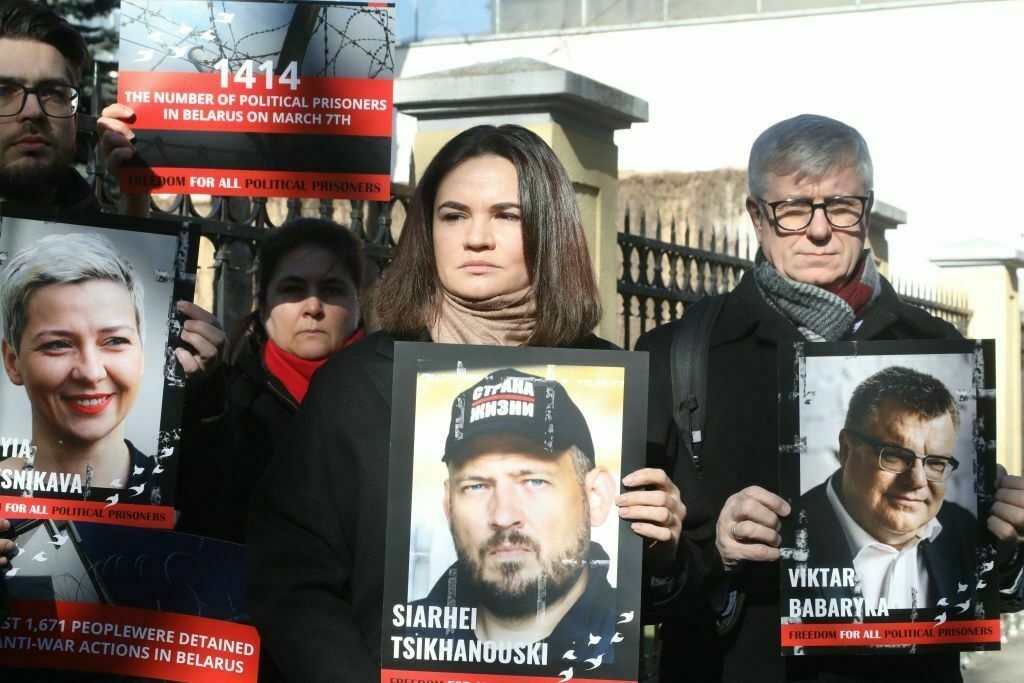
“President Trump now has the power and opportunity to free all political prisoners in Belarus just like that. And I ask him to do so,” Tsikhanouski said.
Sviatlana Tsikhanouskaya, who, since being forced into exile, has led the Belarusian opposition, hailed the releases, pledging to “continue to work closely with President Trump’s administration and with all our allies on both sides of the Atlantic to achieve the freedom of every political prisoner.”
European leaders, including EU Commission President Ursula von der Leyen, European Parliament President Roberta Metsola, Polish Foreign Minister Radoslaw Sikorski, and others, also welcomed the U.S. diplomatic efforts and the freeing of the political prisoners.
Following four years of continuous, harsh repression, Lukashenko suddenly pardoned 18 political prisoners in July 2024, then continued to release small batches of political prisoners every month for half a year. Tsikhanouski said he had heard talk of his potential release in August 2024.
In February, U.S. Deputy Assistant Secretary of State Christopher W. Smith made an unannounced visit to Belarus, securing the release of a U.S. citizen and two Belarusian political prisoners.
John Coale, Kellogg’s deputy, during a low-profile visit to Minsk in May facilitated the release of dual U.S.-Belarusian citizen Yuras Ziankovich. The earlier contacts paved the way for Kellogg’s high-profile visit, accompanied by Smith and Coale.
The publicity surrounding the visit indicates that the parties “have reached a minimum level of mutual trust,” commented Valery Kavaleuski, a former Belarusian diplomat and ex-member of Tsikhanouskaya’s shadow cabinet. He is currently advocating for the release of political prisoners as the head of the Euro-Atlantic Affairs Agency.
Restoring ties?
One thing Belarusian officials did signal was that they expect more in return, including full restoration of bilateral ties and sanctions relief.
Belarus’s permanent representative to the United Nations, Valentin Rybakov, on state-owned Belarusian television after the Kellogg meeting, said that Minsk seeks to “normalize” bilateral relations with the U.S., which would entail the full resumption of embassy operations in both countries and exchanges of visits by officials.
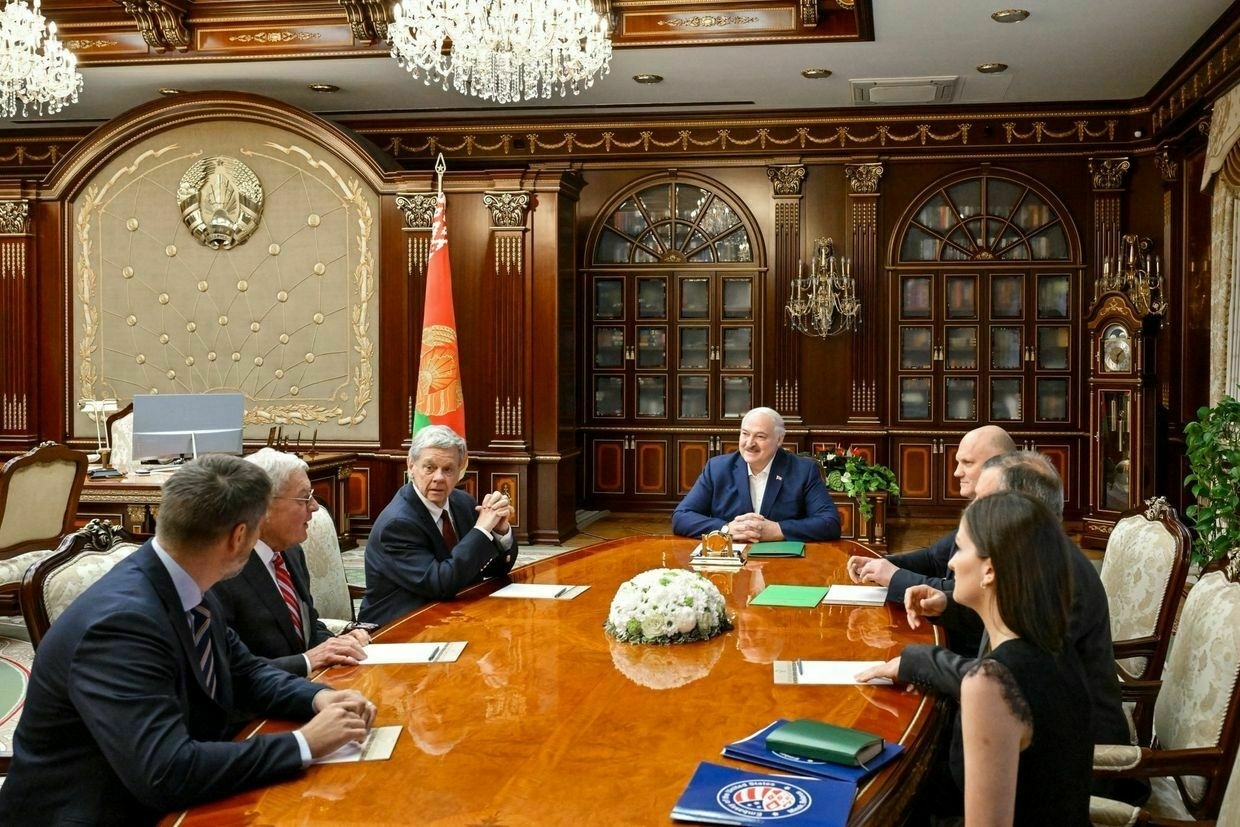
The U.S. withdrew its diplomats and shut down embassy operations in Minsk in February 2022, following Russia’s full-scale invasion of Ukraine, which involved the use by the Russian military of Belarusian territory. According to Kavaleuski, the reopening of the embassy lies within U.S. interests in observing and gathering information on the ground. Reopening at the Charge d'Affaires level, as opposed to the ambassadorial level, does not imply any formal recognition of Lukashenko’s legitimacy.
“Without Europe's participation, the ‘de-isolation’ of the Belarusian regime will not be as effective.”
On sanctions relief, Rybakov and Natallia Esismant, Lukashenko’s press secretary, noted that this had been among the priority topics of the discussion. The New York Times also reported that the matter was discussed during Khristopher Smith’s visit to Belarus in February.
“According to our information, Lukashenko is setting a condition for the lifting of the American sanctions on (potash producer) Belaruskali,” opposition activist and leader of the People’s Anti-Crisis Management initiative, Pavel Latushka, told the Kyiv Independent.
“The second is the financial sector, which enables financial payments,” he added. “The third is the Belavia (…) aircraft fleet, which includes (Lukashenko’s) planes.”
In 2019, before Belarus spiraled into political turmoil, potash, its top export, brought in approximately $2.9 billion in export revenues. After the EU and U.S. export restrictions were put in place, Belarus’s share of the global potash market dropped from 18% in 2021 to 8% in 2023, according to the International Food Policy Research Institute. Around 5% of the market was lost in the United States.
“But without Europe's participation, the ‘de-isolation’ of the Belarusian regime will not be as effective,” Rudnik from the Center for New Ideas told the Kyiv Independent, noting that while the U.S. can cancel its own sanctions, Washington would have to lobby for their relief in Europe.
Analysts agree that to restore the flow of this crucial export, Belarus needs to ease European sanctions and overcome opposition from Lithuania, home to Klaipeda seaport, formerly the chief transit hub for Belarusian potash.
Initially introduced in 2021 for human rights abuses, European sanctions on Belarusian potash were re-qualified as sanctions for Minsk’s support for Russia’s war against Ukraine, making them impossible to cancel until the war ends, former diplomat Kavaleuski says, citing his recent exchanges in Brussels.
Belarus, in contrast, expects reciprocal steps and a "good-neighborly approach” after releasing citizens of Estonia, Latvia, and Poland, said Belarus’s KGB Chief Ivan Tsertsel on state-run media, in an apparent reference to European opposition to sanctions relief. Notably, no Lithuanian citizens were included in the release.
But the European Union has so far shown no inclination to reduce restrictions on Lukashenko. Quite the opposite: the 18th sanctions package, recently blocked by Hungary and Slovakia, proposes to ban all transactions with Belarusian banks, further tightening restrictions against Belarus.
"It’s Lukashenko who pushes Belarus closer to Russia because it’s comfortable for him."
And Lithuania, one of the EU member states with the strongest voice on the Belarusian issue, sees no grounds for reconsidering sanctions yet, according to Lithuanian Foreign Minister Kęstutis Budrys. Aware of the potential for a veto by Hungary or Slovakia on Europe-wide sanctions, the Baltic state is developing legislation for national economic sanctions that would provide for the introduction of personal and sectoral restrictions.
While thankful for the release and hopeful for more good news, the Belarusian opposition is cautious about rewarding the regime too soon.
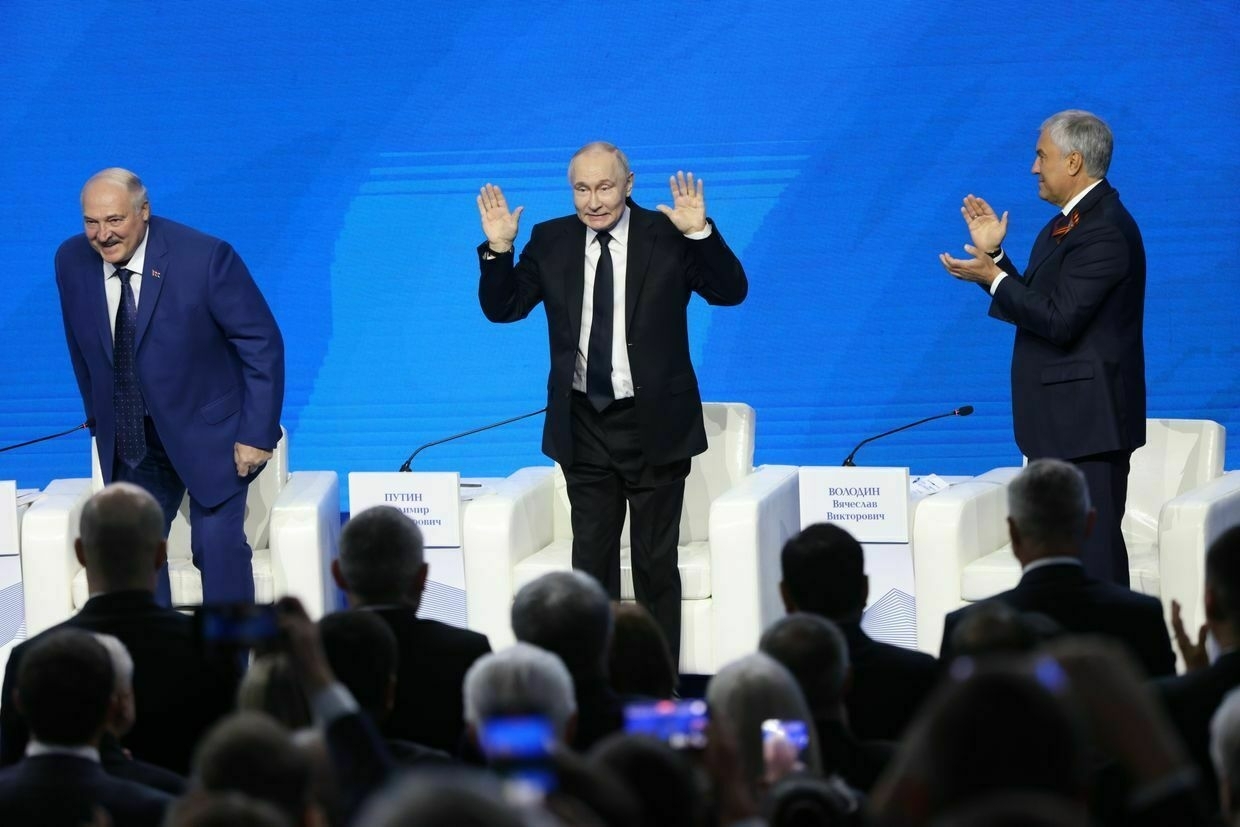
“Naturally, if the repression stops, and all the prisoners are released, it would open new possibilities, and one could talk about certain relief from the American sanctions,” Tsikhanouskaya’s advisor Viachorka says, adding that at this point, only 1.5% of the country’s 1,100 political prisoners have been released through U.S. mediation.
“There’s no trust in Lukashenko,” said exiled activist Latushka, who is known for his more hawkish approach to contacts with the Lukashenko regime.
“Over the 30 years of his rule, Lukashenko has repeatedly used this scheme of easing sanctions by making cosmetic concessions to the West.”
Latushka argues that sanctions should be eased only after the release of all political prisoners, a halt to repression, and the decriminalization of political life within the country. Even after that, restrictions should be suspended but not cancelled to ensure the possibility of swift reinstatement in case of backsliding by Minsk, he said.
But having released 14 prisoners, Belarusian KGB Chief Tsertsel reported that another 14 foreign and Belarusian citizens had been arrested in Belarus on charges of espionage and high treason in 2025 — in a sign the regime's "conveyor belt" of repression has far from slowed down.
Washington's interest in Minsk
Following his visit to Minsk, Kellogg shared that while his deputy John Coale led discussions on the release of prisoners, he had focused on the Russia-Ukraine War.
“We know Trump is, first and foremost, a dealmaker, and secondly, that success is important to him,” Rudnik said of the interest of the Trump administration in dealing with Belarus.
“And when this does not happen for a long time, especially when he promised so much in his election campaign, it becomes necessary to compensate for the lack of these victories with smaller victories, perhaps even a lot of them,” she said.
Observers interviewed by the Kyiv Independent do not believe Belarus could serve as a credible platform for the stalled Russian-Ukrainian peace negotiations — an idea that has been floated by the Kremlin, but flatly rejected by Ukrainian President Volodymyr Zelensky over Belarus's complicity in the war.
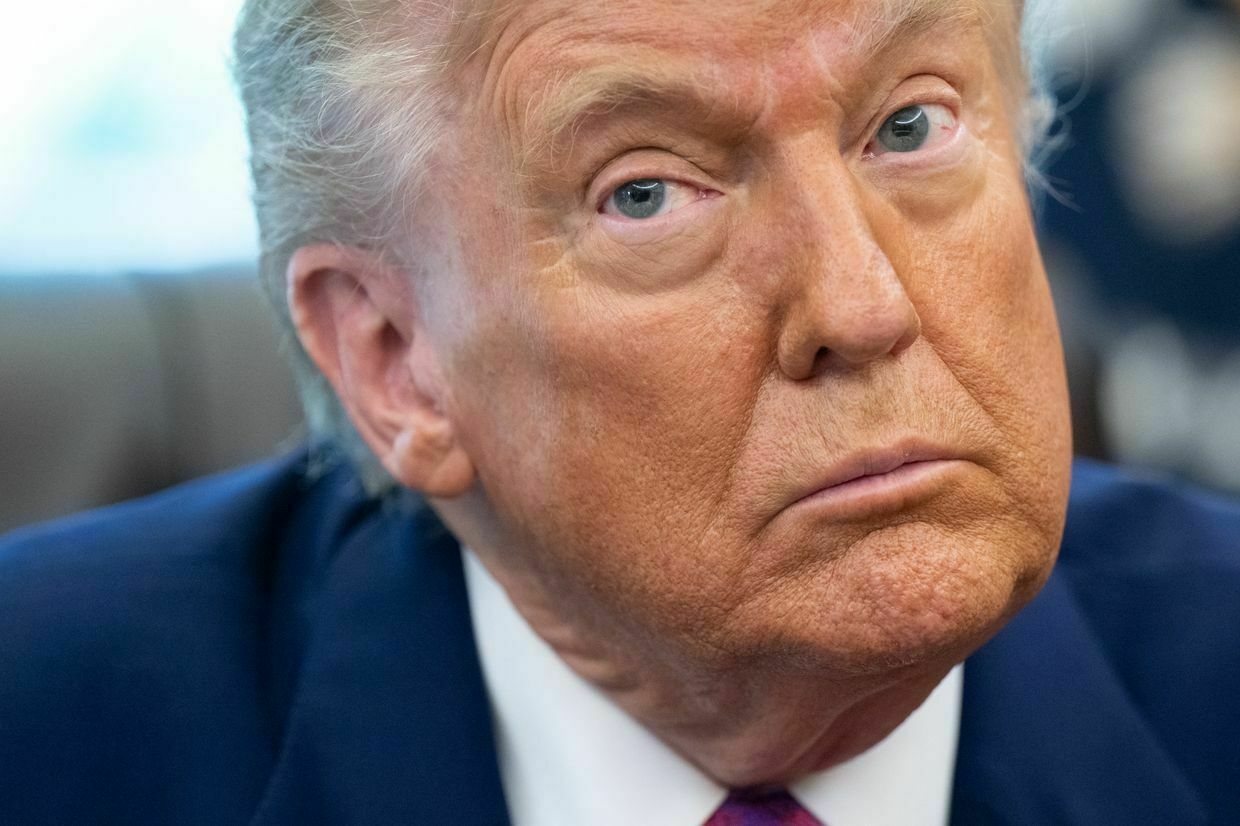
While not having sent his troops into battle in Ukraine, Lukashenko let the Russian army use Belarusian territory to mount attacks on Ukraine at the start of the invasion. He also reoriented the Belarusian military-industrial complex to serve Russian defense contracts, according to a recent report by the Belarusian opposition group Belpol.
Aside from “scoring a win” easier than stopping Russia’s war, Washington may have warned Belarus against becoming more deeply engaged in the Kremlin’s war against Ukraine, or escalating tensions with the NATO and EU member states bordering Belarus, analysts suggest.
“Belarus is strategically placed on NATO’s eastern flank between Russia and western states,” Tsikhanouskaya’s advisor Viachorka says. “The less of a threat Belarus is, the less defense spending for America.”
Belarus is set to host the Zapad-2025 (West 2025) joint military drills with Russia in September. After the Russia-Belarus Union Resolve 2021 drills were used to disguise the buildup of Russian troops ahead of an all-out invasion, any joint drills in Belarus are now seen as a serious cause for concern among its neighbors.
In an apparent effort to assuage those fears, in May, Belarusian Defense Minister Viktar Khrenin announced the drills would involve fewer troops and would be held at a location further from the border.
The Kellogg visit, Latushka believes, also had the aim of determining whether Lukashenko is capable of altering his domestic or foreign policy, and the extent of the Kremlin’s influence over him.
Americanist and advisor to the Euro-Atlantic Affairs Agency Anton Penkovski told the Kyiv Independent that the Trump administration might be considering the possibilities for the “Finlandisation” of Belarus, a term that implies Minsk would loosen its military ties with Moscow without fully breaking off ties.
And while having nothing to lose in the event of negotiations failing, U.S. diplomats might also have been investigating Lukashenko’s ability to act independently and engage in separate negotiations in the event of Russia being weakened.
Indeed, Washington has a history of engaging with Minsk at times when tensions with Moscow heighten.
Viachorka, however, is not so sure.
“We often hear the message that we need to save Lukashenko from Russia, including from Belarusian propaganda,” he says. “But it’s Lukashenko who pushes Belarus closer to Russia because it’s comfortable for him.”
<span data-sanitized-id="belarus-weekly-info" data-sanitized-class="belarusWeekly__info"></span>
<button data-sanitized-id="belarus-weekly-subscribe-btn" data-sanitized-class="belarusWeekly__form_button">
<span data-sanitized-class="belarusWeekly__form_label">Join us</span>
<path d="M4.45953 12.8114H7.90953C8.00052 12.8127 8.09085 12.7958 8.17517 12.7616C8.25949 12.7274 8.3361 12.6766 8.40044 12.6123C8.46478 12.548 8.51556 12.4714 8.54975 12.387C8.58395 12.3027 8.60088 12.2124 8.59953 12.1214C8.58173 11.9269 8.48974 11.7467 8.34265 11.6183C8.19555 11.4898 8.00465 11.4229 7.80953 11.4314H4.45953C4.27653 11.4314 4.10103 11.5041 3.97163 11.6335C3.84223 11.7629 3.76953 11.9384 3.76953 12.1214C3.76953 12.3044 3.84223 12.4799 3.97163 12.6093C4.10103 12.7387 4.27653 12.8114 4.45953 12.8114Z" fill="white"></path>
<path d="M8.6 15.0114C8.60135 14.9204 8.58442 14.83 8.55022 14.7457C8.51603 14.6614 8.46525 14.5848 8.40091 14.5205C8.33656 14.4561 8.25996 14.4053 8.17564 14.3711C8.09131 14.3369 8.00098 14.32 7.91 14.3214H2.69C2.507 14.3214 2.3315 14.3941 2.2021 14.5235C2.0727 14.6529 2 14.8284 2 15.0114C2 15.1944 2.0727 15.3699 2.2021 15.4993C2.3315 15.6287 2.507 15.7014 2.69 15.7014H7.81C8.00511 15.7099 8.19602 15.643 8.34311 15.5145C8.49021 15.386 8.5822 15.2058 8.6 15.0114Z" fill="white"></path>
<path d="M24.4202 6.01122H7.55022C7.43403 5.99626 7.31641 5.99626 7.20022 6.01122L7.08022 6.06122C6.85578 6.16602 6.66595 6.33276 6.53308 6.54181C6.4002 6.75086 6.32982 6.99352 6.33022 7.24122C6.32744 7.43266 6.36832 7.62222 6.44976 7.79549C6.5312 7.96876 6.65105 8.1212 6.80022 8.24122L12.5802 13.4512L6.89022 18.7112C6.71923 18.8375 6.57973 19.0016 6.4826 19.1907C6.38546 19.3797 6.33331 19.5887 6.33022 19.8012C6.32652 20.0535 6.3952 20.3015 6.52812 20.516C6.66105 20.7304 6.85264 20.9023 7.08022 21.0112C7.14691 21.0484 7.21729 21.0786 7.29022 21.1012C7.46476 21.1609 7.64625 21.1979 7.83022 21.2112H24.5102C24.8263 21.2048 25.1378 21.1355 25.4268 21.0074C25.7158 20.8792 25.9763 20.6948 26.1932 20.4648C26.4101 20.2349 26.579 19.9641 26.6901 19.6681C26.8012 19.3722 26.8522 19.0571 26.8402 18.7412V8.47122C26.8278 7.82952 26.5701 7.21694 26.12 6.7594C25.6699 6.30185 25.0616 6.03412 24.4202 6.01122ZM8.57022 8.08122L7.92022 7.49122H24.4202L16.4902 14.6812C16.407 14.7305 16.312 14.7565 16.2152 14.7565C16.1185 14.7565 16.0235 14.7305 15.9402 14.6812L8.57022 8.08122ZM7.73022 19.7912L8.48022 19.1112L13.4802 14.5812L14.8802 15.8612C15.1804 16.157 15.5793 16.3315 16.0002 16.3512C16.4212 16.3315 16.82 16.157 17.1202 15.8612L18.5202 14.5812L24.2002 19.8012H7.73022V19.7912ZM25.3502 18.7112L19.6602 13.5912L25.3502 8.37122V18.7112Z" fill="white"></path>
</button>
</div>
 The Kyiv IndependentTim Zadorozhnyy
The Kyiv IndependentTim Zadorozhnyy